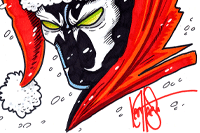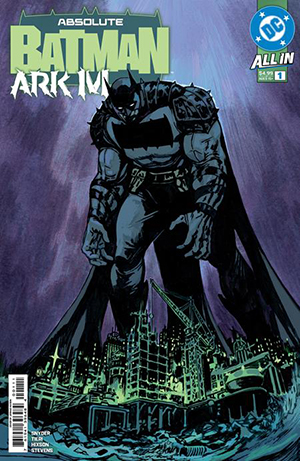|
 |
WAITING
FOR TOMMY: JASON LIEBIG
By Richard Johnston And
so Marvel Knights happened. The structure of the deal was
annoying to someone working in editorial row. We had all sorts
of limitations regarding budgets, computer coloring, and scheduling
that Marvel Knights ultimately got to ignore. As I said to
Joe Quesada shortly before I was fired, if I had a MONTHLY
book in MY office that came out 13 times in two years (as
in his OWN Daredevil), I would have been let go, or at LEAST
the book would have changed offices to get it on time. Marvel
Knights didn't have those restrictions, and that was definitely
a note of frustration, certainly for me.
So many
things annoyed me as an editor. I was thrilled that Marvel
Knights put out an exceptional Punisher series when they did,
but they had the luxury to fail miserably with two previous
Punisher series. No one would have gotten that many swings
of the bat, but they did. It seemed as if Marvel Knights got
to use more money, have more time, with less restrictions,
all so that they could look good in relation to the standard
editorial row. It shouldn't have been a shock, then, that
a percentage of the time, it worked. They put out a few really
nice books, and some stinkers, but a few really nice books.
So ultimately,
to me at least, Marvel Knights was a perfect example of another
executive "pet project" at Marvel. A new president gets hired
at Marvel. They want to make an impression, so they fiddle
with editorial. First it was Heroes Reborn, then Marvel Knights,
and ultimately later on... the Ultimates. Well, every president
creating those projects has a personal vested interest in
seeing those succeed, and they have the power to pull purse
strings and schedule strings to make sure they DO succeed.
Right or wrong, it was just fabulously annoying, when we had
to struggle at the time just to get computer coloring on a
small percentage of our books.
RICHARD:
You were there when the 'coup' happened - Bob Harras and his
cohorts deposed, Joe Quesada instated and Bill Jemas' role
made more public. How much of a surprise was this, and how
did it go over?
JASON:
I WAS there when the coup happened, and I was one of Bob Harras'
cohorts. I can only speak for myself about how this went over
when I say that I saw Bob Harras, a man I respected, and whom
I was intensely loyal to, get fired. The editor-in-chief position
had been a tough one for the years leading up to this. Leading
an editorial department through a bankruptcy and a rotating
door of presidents could not have been easy. It didn't look
it from where I was sitting, so a part of me was happy for
Bob to get out of what had become a thankless position. But
you also see someone whom you respect and who had given a
company over a decade of their life get pushed out, it ain't
pretty. And the truth is pretty ugly on this. Joe went after
that job, and he had to go after Bob to get it. Make no mistake.
Coup d'etat is a more accurate term. Look it up: "the violent
overthrow or alteration of an existing government". Quesada
worked hard to make it happen.
As for
Joe Q? I liked Joe Quesada up to that time. As for Bill Jemas,
I just thought he was another loud-mouth (and somewhat angry)
president at that point. Ultimately, for me, the change went
over badly. I was really pissed off. And I am not one to keep
my opinions to myself. I don't rely on the internet to vent,
I tell people to their faces what I think of them. (This interview
being a rather ironic twist on that, but I guess I'm only
doing this once.) And as the weeks went on, I began to see
that much of what was being talked about in the press (and
there was an exponential increase in the amount of talking
to the press when Joe and Bill took over) was how horrible
the previous administration had been. Well, I WAS that previous
world, and I took it personally. Also, I thought a lot of
what was being said by Bill & Joe was self-serving bullsh*t.
Pages:
1 | 2
| 3 | 4
| 5 | 6
| 7 Continued
Here... |
 |







